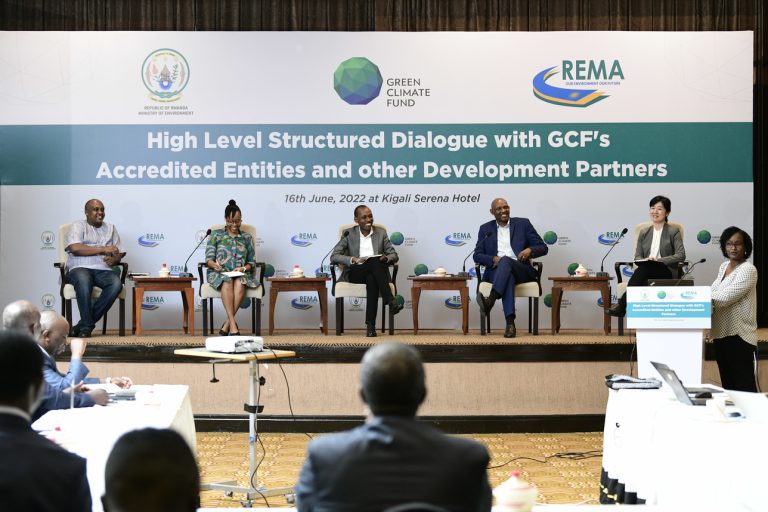
The Rwanda Environment Management Authority (REMA), the Green Climate Fund (GCF) accredited entities and other development partners met in a high-level structured dialogue to discuss, understand and assess the climate financial needs of Rwanda, as well as to understand how these financial resources can be effectively mobilized.
The dialogue was prepared by REMA – the National Designated Authority (NDA) for the GCF, one of the financial mechanisms of the UNFCCC – and brought together representatives from public and private institutions, local and international Non-Governmental Organizations as well as private sector with businesses involved in climate change, environment and biodiversity conservation.
During the dialogue, REMA together with the GCF accredited entities and other development partners shaded light on ways to engage with GCF as well as other climate funds. The funds help countries to become more resilient to climate change threats and give a chance for quality projects to access funding, hence achieving the Nationally Determined Contribution (NDC) targets and practicing country ownership.
“There is no doubt that addressing the impact of climate change is at high cost, and our country is vulnerable to the impact of climate change. In this respect, Climate finance is needed for mitigation, because large-scale investments are required to significantly reduce emissions. Climate finance is equally important for adaptation to the adverse effects of a changing climate, because our economy can only prosper if nature also prospers” said Faustin Munyazikwiye, Deputy Director General of REMA.
Munyazikwiye reminded that the Government of Rwanda has made it clear through its Nationally Determined Contributions submitted to the UNFCCC, stating that by 2030, Rwanda need USD 11 Billions, to be able to attain its targets that will help to reduce the greenhouse gas emissions by 38% in 2030 and support adaptation actions in key seven sectors (Agriculture, Water, Land and Forestry, Mining, Human Settlement, Health and Cross sectoral response).
The structured dialogue was an opportunity to highlight and discuss new solutions to the challenges facing our planet and community such as climate change risks and impacts.
In a journey to raise climate finance, “we call upon the government institutions, private sector and NGOs to contribute significantly. In this line, we encourage more the private engagement in climate actions implementation. Taking these steps will not only benefit the sector but as well as the community” Munyazikwiye added.
Participants reiterated that in order to respond to the above challenges, there is need for innovative policies, redirected investment, environmentally sound technologies, and capacity development to support countries to transition to inclusive green economies. This includes ways to invest in environment and biodiversity management, disaster risk management and coming up with adaptation and mitigation interventions to combat climate change. (End)
